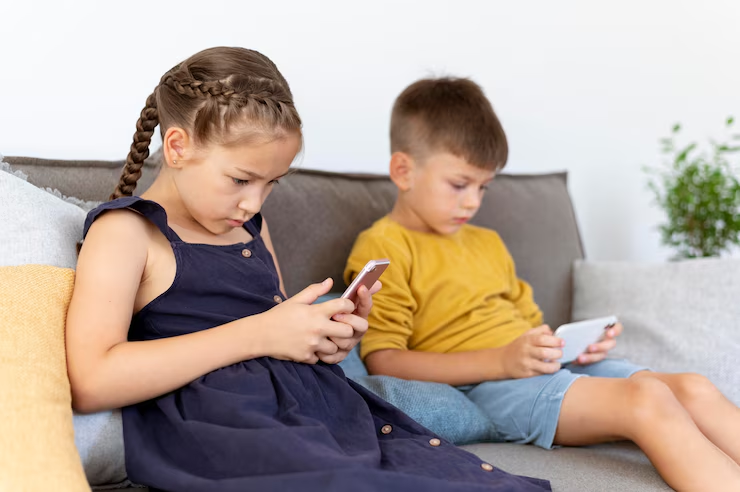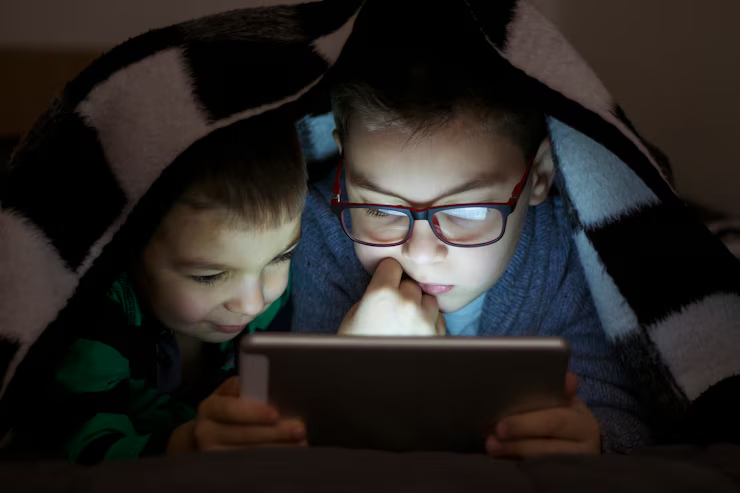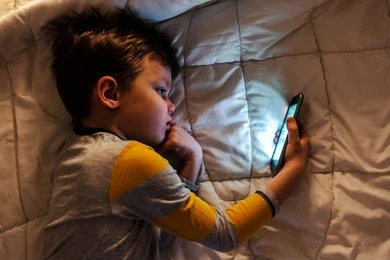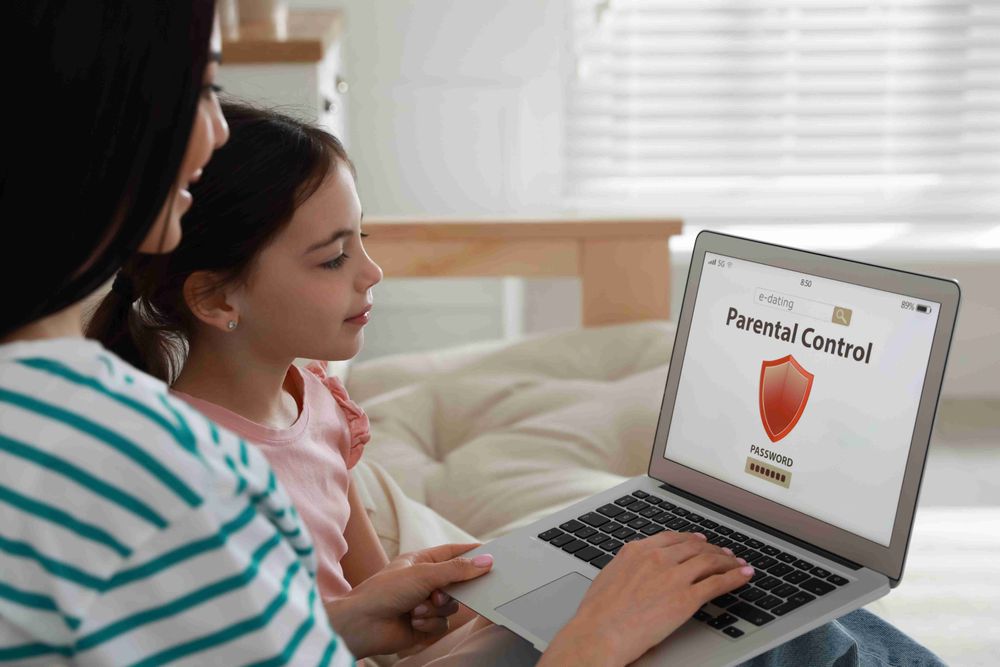
Internet Addiction in Children and Its Effect on Mental Health
The internet has transformed the way we live, learn, and connect. From entertainment to education, everything is just a click away—even for children. However, with these advantages comes a growing concern: internet addiction among children.
While digital tools can support learning and creativity, too much screen time and uncontrolled internet use can impact a child’s mental health, social life, and overall development. This blog will explore how internet addiction affects different age groups and what parents and caregivers can do to maintain a healthy balance.
What Is Internet Addiction?

Internet addiction is a psychological condition where a person—adult or child—feels an excessive or uncontrollable urge to use the internet. In children, this often includes overuse of:
- YouTube and videos
- Online games
- Social media apps
- Educational platforms turned into entertainment
Children with internet addiction often feel anxious or upset when they are not online. Their dependency interferes with their studies, sleep, emotions, and real-life relationships.
The Root Causes of Internet Addiction in Children
1. Easy Accessibility to Devices
Today’s children are surrounded by technology. Smartphones, tablets, and laptops are easily available at home and even in schools. Many toddlers can operate apps like YouTube or games without any help. This constant availability makes it easy for them to turn to screens for entertainment, learning, or comfort. When devices are always within reach, children naturally spend more time online, increasing the chances of forming unhealthy screen habits or even addiction at an early age.
2. Lack of Supervision
With parents often busy with work, chores, or online activities themselves, many children use the internet without much supervision. They may watch videos, play games, or access content that’s not age-appropriate. Without clear rules or monitoring, kids can easily fall into patterns of overuse. Over time, this unsupervised exposure may affect their mood, sleep, studies, and even emotional development, as they miss out on important offline interactions.
3. Pandemic-Era Learning Habits
The COVID-19 pandemic led to a huge shift toward online learning. While digital classes helped children continue their education, they also increased daily screen time. Even after schools reopened, many kids stayed used to being on devices for long hours. The routine of using screens for both learning and entertainment has made it difficult for many children to limit their internet use, contributing to habits that are hard to break.
4. Peer Pressure & Social Media Trends
Children and teens are deeply influenced by what their friends are doing online. Whether it’s playing a trending game, following influencers, or posting on social media, there’s pressure to stay connected and keep up. This kind of peer influence often leads to more time spent online, even when it’s not necessary. Over time, the fear of missing out (FOMO) can increase screen dependence and cause anxiety or stress.
5. Emotional Neglect or Loneliness
Children who feel lonely, ignored, or emotionally disconnected may turn to the internet for comfort. Online games, videos, or chatting with strangers can provide a false sense of connection or happiness. But instead of solving emotional problems, this habit can deepen feelings of isolation and lead to internet dependency. Real-world relationships and emotional support are key to preventing this pattern.
6. Parental Screen Habits
Children often imitate what they see. If parents are frequently on their phones—scrolling through social media, watching videos, or working—children pick up the same habits. A home environment where screens are used excessively can send the wrong message. When digital interaction replaces real conversations, kids begin to prioritize screens over people, which can encourage addiction without anyone noticing.

Effects of Internet Addiction by Age Group
Infants & Toddlers (0–3 Years)
Infants and toddlers need real human interaction—touch, eye contact, and voice. Unfortunately, many parents give screens to babies to stop them from crying or keep them busy.
Mental Health Effects:
- Speech Delays: When infants and toddlers spend more time in front of screens than interacting with caregivers, their speech development can suffer. Verbal interaction—like responding to baby sounds, naming objects, and reading aloud—is crucial during early years. Without regular human conversation, children may take longer to speak or struggle with vocabulary and sentence formation.
- Emotional Detachment: Screens cannot replace the warmth of a caregiver’s touch, eye contact, or voice. When toddlers spend too much time with screens instead of engaging in face-to-face play, they may miss out on important emotional bonding. This can lead to reduced trust, insecure attachments, and difficulty recognizing emotions in themselves and others.
- Sleep Irregularities: Screens emit blue light that disrupts the natural production of melatonin, a hormone that helps regulate sleep. Infants exposed to screens—especially before bedtime—may have trouble falling asleep, staying asleep, or developing a healthy sleep routine. Poor sleep can affect their mood, immunity, and brain development.
- Attention Issues: Early and frequent screen exposure can overstimulate a child’s brain. Fast-moving animations and rapid scene changes train young minds to expect constant entertainment. As a result, children may struggle to focus on slower-paced real-world activities like playing with toys, listening to stories, or interacting with others.
Babies need humans, not screens.

Tips for Parents:
- Avoid Screens Altogether for Children Under 2: Health experts, including the World Health Organization and the American Academy of Pediatrics, strongly advise that children under 2 years of age should not have any screen time (except for video calls with family). At this age, babies learn best through direct interaction with people—not from watching cartoons or videos. Early exposure to screens can interfere with critical brain development and delay important milestones.
- Play with Building Blocks, Sing Rhymes, and Read Picture Books: Simple, hands-on activities are far more beneficial than screen-based entertainment. Building blocks help develop motor skills and spatial understanding. Singing rhymes encourages early language recognition and emotional bonding. Picture books stimulate imagination and introduce basic vocabulary in a fun, engaging way. These traditional play methods are key to a child’s social and cognitive development.
- Maintain Eye Contact, Talk, and Respond to Your Child’s Sounds and Actions: Face-to-face communication is how babies begin to understand the world. When you talk to your baby, smile, respond to their babbles, and hold eye contact, you’re building their emotional security and helping them learn language. These real-life interactions lay the foundation for trust, empathy, and early learning in ways no screen ever can.
Preschoolers (3–6 Years)
This age group thrives on creativity, pretend play, and imagination. However, digital entertainment can dull these developmental experiences.
Mental Health Effects:
- Aggressive Behavior: Preschoolers are impressionable and tend to imitate what they see. Exposure to violent cartoons, games, or aggressive characters on screens can lead children to mimic those behaviors during play or with peers. Without understanding the context, they may think aggression is a normal or acceptable way to express emotions or solve problems.
- Reduced Emotional Skills: Screens don’t teach the subtle human cues that are essential for emotional development—like facial expressions, tone of voice, and body language. When children spend more time with screens than with people, they may struggle to understand others’ feelings or express their own emotions in healthy ways. This can affect their ability to form friendships and respond empathetically.
- Poor Creativity: Passive screen time leaves little room for imagination or problem-solving. Watching shows or playing repetitive games doesn’t challenge the brain the way free play, storytelling, or building things does. As a result, children may show less interest in creative activities like drawing, pretend play, or exploring the world around them.
- Difficulty With Transitions: Preschoolers often become deeply absorbed in screen-based activities. When it’s time to stop watching or put the device away, they may become irritable, throw tantrums, or refuse to cooperate. This difficulty in transitioning from screen time to real-life tasks can affect their routine, discipline, and overall behavior at home and school.

Tips for Parents:
- Co-watch shows and explain what’s happening.
- Introduce physical games and activities.
- Restrict screen time to less than 1 hour a day, as per WHO guidelines.
Primary School Children (6–12 Years)
This is when children begin formal learning and often get their first device. Digital content can be educational—but it can also become an obsession.
Mental Health Effects:
- Decline in Academic Focus: As children grow older, their exposure to online games, YouTube, and social media increases. This often leads to reduced interest in schoolwork, reading, or learning activities. When entertainment becomes the priority, homework is either rushed or avoided. Over time, this habit can negatively impact academic performance, attention span, and overall learning motivation.
- Irritability: Many school-aged children show mood swings or frustration when asked to pause a game or turn off a device. This irritability is a common sign of screen dependence. Constant digital stimulation rewires the brain to expect instant gratification, making real-world tasks feel slow or boring—triggering emotional outbursts when screen time is limited.
- Social Withdrawal: Children in this age group may start avoiding physical play or outdoor activities, preferring to stay glued to their devices. This leads to fewer opportunities for real-life social interaction. Over time, kids might become isolated, struggle to make friends, or lose interest in family activities—leading to emotional detachment and low confidence.
- Sleep Disruption: Late-night screen use, especially without limits, is a major contributor to poor sleep in this age group. Bright screens and stimulating content delay sleep onset, reduce sleep quality, and shorten total rest time. Inadequate sleep affects mood, concentration, behavior, and emotional resilience—key elements for mental well-being and healthy growth.

Tips for Parents:
- Use Parental Controls on Apps and Browsers: Technology can be a helpful ally when used wisely. Most apps, games, and browsers today offer built-in parental controls that allow you to filter content, set screen time limits, and block inappropriate material. These tools help ensure your child isn’t exposed to harmful or age-inappropriate content and reduce the chances of developing unhealthy digital habits. Regularly reviewing your child’s app usage and browsing history can also offer insights into their interests and online behavior.
- Maintain a Fixed Screen-Time Schedule: Consistency is key. Setting a daily or weekly screen-time routine helps children understand boundaries. For example, you might allow one hour of screen time after homework or chores are completed. A predictable routine encourages self-discipline and teaches children time management. Be sure to enforce screen-free times, especially during meals, before bedtime, and during family interactions, to protect both their health and social development.
- Involve Kids in Non-Digital Hobbies Like Music, Reading, or Crafts: Encouraging children to explore hobbies away from screens builds creativity and self-esteem. Whether it’s learning a musical instrument, painting, gardening, or reading books, these activities stimulate the brain in healthier ways than passive scrolling or gaming. They also provide valuable downtime, emotional regulation, and opportunities for personal expression. Making time for offline play and creativity helps children discover their talents and form stronger family and peer connections.
Preteens (12–14 Years)
These years are filled with hormonal changes, identity exploration, and growing independence. The internet becomes a tool for expression and social connection.
Mental Health Effects:
- FOMO (Fear of Missing Out): Teenagers often feel pressured to stay connected 24/7 through social media platforms like Instagram, Snapchat, or YouTube. They constantly check notifications, updates, and group chats to avoid feeling left out. This persistent fear of missing out—commonly called FOMO—creates underlying stress and anxiety. It can also lead to sleep disturbances and an inability to focus on real-life responsibilities like studies or family interactions.
- Self-Esteem Issues: Social media often presents an unrealistic version of life—filtered photos, staged happiness, and ideal body types. Teenagers, who are still forming their identity and self-worth, may start comparing themselves to influencers or peers. This comparison can lead to body image issues, low confidence, and even disordered eating. Over time, excessive scrolling can contribute to negative self-perception and emotional instability.
- Cyberbullying: Unlike traditional bullying, online harassment can happen anytime and often anonymously. Hurtful comments, trolling, exclusion from digital groups, or the spread of rumors can deeply affect a teenager’s mental health. Victims of cyberbullying may experience anxiety, shame, isolation, and in severe cases, symptoms of depression. Many teens hesitate to speak up, making early detection and open communication with parents crucial.
- Content Overload: With platforms like TikTok, YouTube Shorts, and Instagram Reels, teenagers are constantly exposed to fast, attention-grabbing content. This flood of short-form media overstimulates the brain and weakens the ability to focus on longer, meaningful tasks. It also affects emotional regulation, as the rapid pace doesn’t allow time for processing feelings, leading to impulsivity, restlessness, and difficulty with patience in real-life situations.

Tips for Parents:
- Keep Digital Devices Out of the Bedroom at Night: Establishing a “no-devices-in-the-bedroom” rule during sleep hours can significantly improve sleep quality and reduce late-night scrolling or gaming. The presence of phones or tablets in the bedroom often leads to disrupted sleep cycles, reduced rest, and exposure to unwanted content at night. By keeping screens out of the sleeping area, teens are more likely to get proper rest, which directly impacts mood, academic performance, and mental clarity.
- Educate About Online Safety and Emotional Intelligence: Teenagers need to understand both the technical and emotional aspects of being online. Teach them about privacy settings, the dangers of oversharing, recognizing cyberbullying, and identifying fake or manipulative content. At the same time, help them build emotional intelligence—how to manage digital pressure, set healthy boundaries, and process emotions triggered by online interactions. These skills empower them to use the internet responsibly and confidently.
- Encourage Open Discussions About What They See and Feel Online: Create a safe, judgment-free space where teens feel comfortable talking about their online experiences—whether it’s something funny, confusing, upsetting, or even inappropriate. Open communication strengthens trust and helps parents guide their teens without seeming controlling. Regular conversations about how online content makes them feel also encourage critical thinking, emotional reflection, and awareness of media influence.
Teenagers (15–18 Years)
Teenagers often juggle academics, social life, and self-identity through their online presence. However, the internet can consume their emotional world.
Mental Health Effects:
- Depression & Anxiety: Excessive screen time—especially unstructured social media use—can fuel emotional distress in children and teens. Constant scrolling, exposure to negative or triggering content, online arguments, and poor academic performance all contribute to feelings of inadequacy and hopelessness. Over time, this digital stress can lead to clinical symptoms of depression and anxiety, such as irritability, social withdrawal, and low self-esteem.
- Addiction to Social Media & Gaming: What often starts as casual usage can spiral into compulsive behavior. Many children and teens find it hard to stop scrolling or gaming, even when it interferes with school, sleep, or relationships. This form of behavioral addiction is marked by an inability to control usage despite knowing the negative consequences. It also leads to cravings, withdrawal-like symptoms, and irritability when access is restricted.
- Pornography Exposure: Early and unsupervised access to the internet increases the risk of exposure to explicit content. Without proper guidance or maturity, children may develop distorted ideas about sex, consent, and relationships. Regular exposure can lead to unrealistic expectations, shame, confusion, and even addiction. It may also impair their ability to form healthy, respectful relationships later in life.
- Sleep Loss: Using screens late at night disrupts the body’s natural sleep-wake cycle. The blue light emitted by devices suppresses melatonin, making it harder to fall and stay asleep. Moreover, stimulating activities like gaming or social scrolling delay bedtime and reduce REM (deep) sleep—essential for emotional processing and memory. Sleep deprivation can lead to fatigue, poor academic performance, low mood, and increased risk of mental health disorders.

Tips for Parents:
- Treat Your Teen with Respect—Have Conversations, Not Lectures: Adolescents are more likely to respond positively when they feel heard and respected. Instead of strict rules or scolding, engage in open, honest conversations. Ask about their online habits and how they feel about them. Listen without immediate judgment. This respectful approach helps build trust and makes teens more willing to share concerns, accept boundaries, and seek help when needed.
- Promote Physical Activity and In-Person Friendships: A great way to reduce screen time is by increasing real-life engagement. Encourage teens to participate in sports, dance, hiking, or other physical hobbies. Arrange meetups with friends or enroll them in group activities like art, music, or volunteering. In-person interactions help teens develop emotional intelligence, boost mood, and strengthen real social bonds—something no screen can replicate.
- Consider Therapy or Support Groups If Addiction Affects Daily Life: If internet use starts to harm your teen’s academics, sleep, relationships, or emotional well-being, don’t hesitate to seek professional help. Therapists trained in digital addiction and adolescent behavior can help teens understand the root causes of their dependence and build healthier coping strategies. Support groups also provide a sense of community and reduce the stigma around seeking help.
Warning Signs of Internet Addiction in Children

Recognizing internet addiction early is crucial. While occasional overuse is normal in today’s digital world, consistent behavioral changes may signal a deeper issue. Here are some common red flags:
- Mood Swings or Aggression When Offline: If your child becomes irritable, angry, or even violent when asked to stop using a device or when disconnected from the internet, it may be a sign of dependency. These mood swings often mirror withdrawal symptoms and suggest emotional over-reliance on digital stimulation.
- Skipping Meals or Neglecting Hygiene for Screen Time: When children prioritize screen use over basic needs like eating, bathing, or brushing teeth, it shows that digital content is dominating their routine. Over time, this can impact both their physical health and self-care habits.
- Dishonesty About Usage Hours: If your child hides their actual screen time, deletes history, or lies about the amount of time spent online, it’s likely they recognize the overuse but feel unable to control it. This secrecy creates trust issues and may point to underlying compulsive behavior.
- Loss of Interest in School, Hobbies, or Family: Children addicted to screens often stop engaging in previously enjoyed activities like sports, reading, or spending time with family. This withdrawal can affect social development, creativity, and emotional connection with loved ones.
- Secretive Behavior About Online Activity: Being overly protective of devices, minimizing screens when someone enters the room, or refusing to share what they’re doing online can indicate involvement in risky or inappropriate digital behavior. This can include gaming addiction, chatting with strangers, or exposure to harmful content.
- Declining Academic Performance: One of the clearest indicators of internet addiction is a drop in grades or incomplete schoolwork. When screen time takes priority over studies, children struggle to focus, retain information, and meet academic expectations—leading to frustration and further withdrawal.
If multiple signs persist, it may be time to seek professional help.
The Deeper Mental Health Impact

1. Depression & Loneliness
Although children may appear “social” online, spending hours on digital platforms often disconnects them from real-life human interaction. The result? A feeling of emotional emptiness. Without genuine connections—like eye contact, hugs, laughter, or in-person play—kids begin to feel isolated. This digital loneliness increases the risk of childhood and teenage depression, especially when their self-worth is tied to likes, comments, or followers.
2. Anxiety Disorders
The constant stream of updates, comparison with peers, and pressure to stay relevant online can fuel several anxiety disorders. Fear of missing out (FOMO), online shaming, or cyberbullying can lead to social anxiety, performance anxiety, and even panic attacks. Teens may start fearing judgment, avoiding real-world social settings, or developing irrational worries tied to their online life.
3. Attention Deficit
Apps and platforms are designed to be fast, flashy, and attention-grabbing. Over time, this trains the developing brain to crave instant gratification. As a result, many children struggle to focus on tasks that require patience, like reading, studying, or completing homework. Prolonged exposure can mimic symptoms of ADHD—difficulty sitting still, completing tasks, or managing time effectively.
4. Sleep Disorders
Sleep is vital for mental and emotional health, especially in growing children. However, the blue light from screens reduces melatonin—a hormone that controls sleep. When children use phones, tablets, or TVs before bed, it delays sleep onset and disrupts deep REM sleep, which is crucial for brain development. This leads to tiredness, mood swings, and weakened cognitive function the next day.
5. Social Skill Deficits
Real-world communication involves voice tone, facial expressions, body language, and empathy—skills that can’t be learned through texts or emojis. Children overly immersed in digital worlds often miss out on developing these essential social skills. This can result in awkwardness during face-to-face interactions, difficulty understanding emotions, and challenges forming healthy relationships later in life.
How Parents Can Help Prevent Internet Addiction

Preventing internet addiction isn’t about eliminating screens altogether—it’s about balance, boundaries, and emotional support. Here are practical steps parents and caregivers can take to guide children toward healthier digital habits:
1. Set Time Boundaries
Establish clear rules about when and how long screens can be used. Differentiate between weekday and weekend limits, and consider shorter allowances during school days. Use apps like Google Family Link or Apple Screen Time to monitor and manage screen usage. Encourage regular breaks, especially after online classes or gaming sessions, to reduce eye strain and mental fatigue.
2. Be a Role Model
Children mimic what they see. If parents are glued to their phones during dinner or constantly scrolling through social media, kids will assume that behavior is normal. Show balanced screen habits—put your phone down during family time, read books, and engage in conversations. Your actions set the tone for your child’s digital behavior.
3. Encourage Offline Play
Make real-world fun just as exciting as the virtual world. Plan activities that don’t involve screens—go for walks, start a family puzzle night, enroll kids in dance, music, or art classes. Organize playdates or outdoor games to build real-life friendships and develop creativity, motor skills, and problem-solving abilities.
4. Tech-Free Zones
Create specific areas and times in the home where devices are not allowed. For example, ban phones at the dinner table, during family discussions, and especially in bedrooms. This not only fosters connection but also ensures better sleep and mental rest. Keep devices charging outside the bedroom to reinforce the habit.
5. Emotional Check-Ins
Sometimes children turn to screens because they feel emotionally unattended. Make it a habit to talk to your child daily—not just about their schoolwork, but their feelings, friends, worries, and joys. Offer praise, affection, and emotional availability so they don’t seek validation or escape online.
6. Use Positive Reinforcement
When children follow screen rules or choose to engage in offline activities, reward their effort with encouragement. Simple praise, extra playtime, or small privileges help reinforce healthy habits. Focus on progress, not perfection—acknowledge their effort in balancing tech use.
When to Seek Professional Help
If your child is showing signs of deep emotional distress, addiction, or social withdrawal, consider speaking to a:
- Child Psychologist: A child psychologist specializes in understanding children’s behavior, emotions, and thought patterns. They can assess whether your child is experiencing anxiety, depression, or addiction-related symptoms due to excessive screen use. Therapy sessions can help children process emotions, improve self-regulation, and develop healthier coping mechanisms.
- School Counselor: School counselors are often the first to notice academic or behavioral changes caused by internet overuse. They can provide early interventions, offer coping strategies, and work with teachers and parents to create a supportive school environment. For older children and teens, a counselor can also guide peer-related issues, like cyberbullying or social media stress.
- Pediatrician: Pediatricians not only monitor physical development but also play a key role in screening for developmental delays, sleep disturbances, or behavioral issues linked to screen addiction. They can recommend limits, refer to specialists, and rule out medical issues exacerbated by excessive digital exposure (like vision problems or obesity).
- Addiction Therapist: If the addiction is severe—marked by denial, withdrawal symptoms, and interference with daily life—an addiction therapist may be necessary. These professionals specialize in behavioral addictions (including gaming or internet use) and use evidence-based therapies like CBT (Cognitive Behavioral Therapy) to help your child regain control.
They can help with behavior therapy, group sessions, and digital detox planning.
Conclusion: A Call for Digital Balance
Technology is a tool—it can teach, entertain, and connect. But when it begins to replace real-life experiences, human relationships, and emotional development, it stops being helpful and starts becoming harmful. Excessive internet use, especially among children and teens, can silently chip away at their mental health, social skills, and overall well-being.
Let’s raise children who are digitally wise, emotionally resilient, and socially connected—both online and offline. The goal is not to eliminate technology, but to help our children use it with purpose, balance, and mindfulness. As caregivers, educators, and community members, we must lead by example and create environments where screens support life, not replace it.
FAQs
Q1. What is internet addiction in children?
A: It’s a condition where children compulsively use the internet, often resulting in emotional, social, and academic problems.
Q2. How much screen time is safe for children?
A: Less than 1 hour/day for ages 2–5. For older children, ensure screen time doesn’t interfere with sleep, school, or physical activity.
Q3. Can mobile games cause mental health problems?
A: Yes, overuse can cause aggression, anxiety, sleep problems, and addictive behavior.
Q4. What should I do if my child gets angry when the internet is turned off?
A: Stay calm. Set routines, use rewards for cooperation, and gradually reduce screen dependency. Seek help if anger persists.
Q5. How can I balance learning and entertainment online?
A: Encourage breaks, use educational content with supervision, and discuss what your child learns daily.










